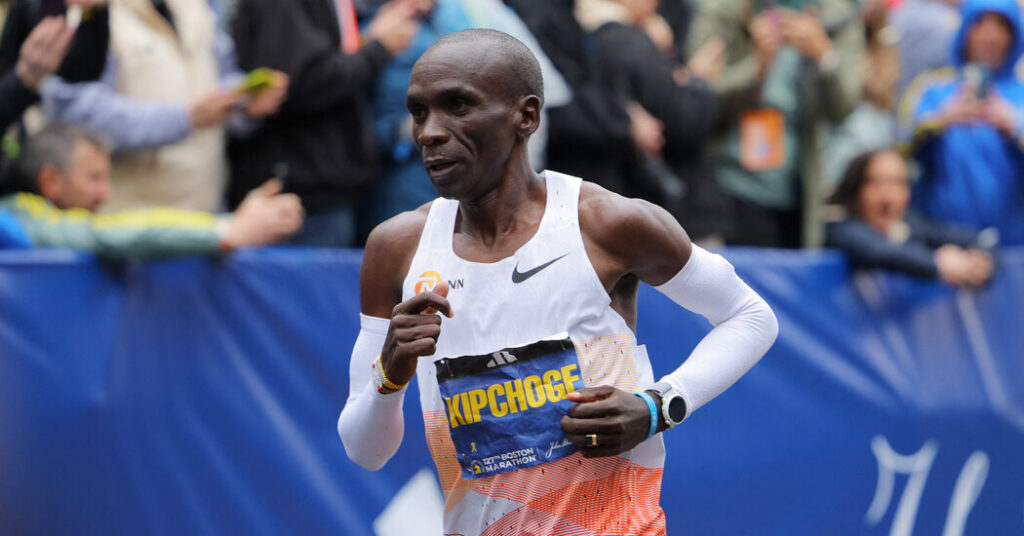BOSTON — When Eliud Kipchoge arrived for the London Marathon in 2020, he had won 10 consecutive marathons, including an Olympic gold medal in 2016. He owned the world record, and he had also completed two unsanctioned marathons in a bid to become the first man to dip under the two-hour barrier, accomplishing the feat in October 2019.
In other words, Kipchoge had already established himself as a semi-mythical figure — and the greatest men’s marathoner in history — by the time he took to the streets of London to defend his 2019 title. Fans who lined the course fully expected the race to be another Kipchoge coronation. Why wouldn’t it be?
Kipchoge finished eighth that day, a shocking development in cold and rainy conditions. Kipchoge later told Runner’s World that he had developed a problem with his right ear and that he was “truly disappointed.”
“But this is sport,” he said at the time. “Today you are up, tomorrow you are down.”
Kipchoge managed to rebound from that subpar result by winning his next four marathons, claiming another Olympic title and breaking his own world record by 30 seconds. It turned out that he was still semi-mythical, after all.
His speed has become so ubiquitous that a company built an oversize treadmill that runs at 13 miles per hour so that weekend warriors can try to mimic his race pace for about 30 seconds.
London, though, offered an important lesson: No one, not even Kipchoge, wins every race. Sure enough, in his debut appearance at the Boston Marathon on Monday, it happened again: He lost.
In the immediate wake of Kipchoge’s sixth-place finish, armchair physicians and amateur running sleuths all tried to answer the same question: How could this have happened?
There was his fast start on an unfamiliar course, and perhaps that sapped his legs by the time he hit the rolling hills over the final third of the race. There was the water bottle he missed at a late aid station, an episode that preceded his struggles. And there was the notoriously tough course itself, with its many dips and climbs, which rewards strength rather than flat-out speed.
On Tuesday, Kipchoge poked his head through the growing mound of speculative forensics to offer his own explanation. At around the 30-kilometer mark, or nearly 19 miles into the marathon, his upper left leg began to bother him.
“There’s where the problem came in,” Kipchoge told reporters at a post-race news conference. “I tried to do what was necessary, but it was not working. I put my mind to try to run at a comfortable pace and just to finish.”
Did he ever consider dropping out of the race?
“A lot was going on in my mind,” he said. “But I said, ‘Hey, I can’t quit.’ They say it’s important to win. But it’s great to participate and finish.”
One of Kipchoge’s biggest challenges moving forward is that he has set an impossible standard for himself. That is what happens when you win 10 marathon majors and two Olympic titles. That is what happens when you run so fast that you blow out the insoles on your racing sneakers and still manage to win the Berlin Marathon.
Overall, Kipchoge has run 18 sanctioned marathons since he moved up to the distance after a decorated career on the track, which included a world championship in the 5,000 meters back in 2003.
Of those marathons, Kipchoge has won 15 of them, which is bananas. Too many things can go wrong over 26.2 miles. Even the best occasionally succumb to injury or intestinal distress. And even the best are susceptible to having a bad day.
“He really is the Michael Jordan or the Tom Brady of the marathon,” said Mark Coogan, a former Olympic marathoner who now coaches Team New Balance Boston, an elite running team. “But those guys didn’t win every game, either. Or they had some subpar performances where they weren’t at their best. And I think that’s going to happen over 20 marathons. You’re going to have one or two that aren’t quite right.”
In Boston, it was a sign of Kipchoge’s celebrity — a brand of fame that now transcends the insular world of marathoning — that his troubles overshadowed the brilliant performances of Evans Chebet, who defended his men’s title, and Hellen Obiri, who ran a savvy race to take the women’s crown. Like Kipchoge, both are Kenyan.
To Chebet’s credit, he did not appear remotely intimidated by Kipchoge. Chebet, 34, is now in the process of assembling his own Kipchoge-like streak, having won six of the last seven marathons he has entered.
“Eliud was not so much of a threat because the bottom line was that we trained well,” Chebet said of the months of pre-race work that he did with Benson Kipruto, a training partner who finished third. “Our confidence in the quality of our training made us feel good about taking on this race.”
Kipchoge, meanwhile, is either so aware of the spotlight on him or holds himself to such a high standard that he opened his news conference on Tuesday by apologizing for his performance.
“I promised that I will run a beautiful race,” he said, adding: “As a human, I was disappointed.”
Yes, he is human. And at 38, with years of 140-mile training weeks in his legs, Kipchoge must know that none of this will last forever. But he also made clear that he was still looking ahead, vowing in his own philosophical way to return to Boston.
“Yesterday is a canceled check,” he said. “Today is cash. Tomorrow is a promissory note. Let us forget about the canceled checks. Let us talk of the cash and the promissory notes.”


